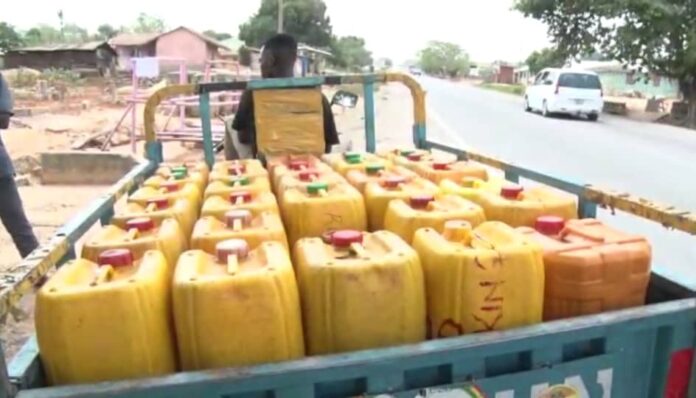To prevent the spread and contracting of COVID-19, the World Health Organization announced some safety protocols. Among them are; wearing of nose mask, physical distancing and frequent washing of hands with soap under running water for at least twenty seconds.

Aside aiding in curbing the spread of COVID-19, hand washing has for decades been proven to be effective in eliminating germs that cause food poisoning which trigger diahorrea among others.
But children in Ninting, a farming community in the Ashanti region of Ghana are unable to observe this critical safety protocol as the pandemic rages on.

For the 2,000 residents of Ninting, water that oozes from rocks scattered in the community have served their needs for decades.
Those who can afford hire the weekly services of tricycles to access water at a cost of Ghc 60 per barrel, from Mampong – at least 8km from Ninting.

To ensure there is water for drinking by both teachers and pupils of the Ninting R/C primary & JHS and Presbyterian primary & JHS, each pupil has a daily routine of carrying a gallon with water to the school.
But that is currently the bane of the pupils as more water is needed in other for pupils and management to observe the handwashing protocols.
“I wish we had water in school for hand washing and other chores, but unfortunately we don’t have unless we come home before washing our hands,” Bismark Owusu, a pupil stressed.
During my visit to the community, I counted at least twenty children gathered in long queues to scoop the water which gathers in a small tunnel before heading to school. I later gathered it is a daily struggle as they have to meet the dictates of the management of their various schools.
“The queue sometimes is very long so we end up running late for school”, a worried student, Ernestina Yeboah told Ibrahim Abubakar.
The Asante Mampong municipality is ranked 20 out of the 43 districts in the Ashanti region with a COVID-19 case count of 192 as at May 14, 2021 with a cumulative case for the region of 15,544.
Although the absence of water has not impacted much on COVID-19 cases in the community, residents want local authorities to urgently attend to their water needs.
Head of Ninting Royal Family, Nana Adu Asare said efforts to get a proper water supply in the community have proven futile even though an extension could be made from Mampong, about 8 kilometers away from Ninting.

“When Nana Addo announced that the assemblies would supply free water to communities without water we were expecting that they will bring us water.
“They started for about two days and on the third day they said the petrol they were using was too much so they wanted the people to buy at 20 pesewas per gallon. Even with that, they stopped within a week”
The Municipal Chief Executive Officer of Mampong, Thomas Appiah Kubi said efforts are being made to provide the community with a water facility.
“When you go round the community, you will realize the availability of some borehole facilities but none is functional at the moment. There is challenge getting water in the area but we are working around the clock to extend water in the community”
According to the State-Level data report, as at May 6 over 3.85 million children have tested positive for COVID-19 since the onset of the pandemic in the United States. This represents 14% of the total cumulated cases in the country.
Available data however indicats that COVID-19-associated hospitalization and death is uncommon in children.
In Ghana, 1,284 children between the ages of 0-14 comprising of 626 males and 658 females were captured in the Child Rights International report on ” COVID-19: State of Children in Ghana” to have contracted the virus as at December 2020. 4 children died out of the 320 cumulative deaths in the country.
As at May 14 2021, more than 93,000 Ghanaians had tested positive for COVID-19, of which 783 people had died.
Though not much children have died in Ghana, the country could prevent even the fewer deaths by ensuring transmission among children is prevented.
Ghana is a signatory to the United Nations Sustainable Development Goals (SDGs) also known as the Global Goals. The seventeen (17) SDGs are serving as blueprint to achieving a better and more sustainable future for all.
Goal 6 calls for access to “safe water and improved sanitation for all” by 2030.
But Ghana plans to meet the target of universal access to safe drinking water by 2025.
Attaining this target will however continue to remain a mirage for the country until water challenge in communities like Ninting is addressed.
According to WaterAid Ghana, 5.5 million people in Ghana lack access to clean water. Without access to clean water, people are unable to wash their hands and protect themselves against the spread of COVID-19.
By Ibrahim Abubakar
The writer is a Mentee under the Mobilizing Media to Fighting COVID-19 project by Journalists for Human Right


